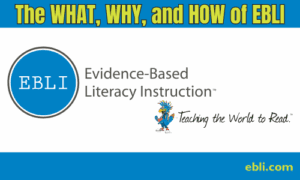How do I know if my student(s) or children are reading successfully?
There is an abundance of information that is easily accessible about reading instructional practices based on the Science of Reading, Balanced Literacy, or other processes to teach or remediate reading. Reading assessments happen routinely in schools too. However, information about the behaviors of a child to look for in order to get a solid feel for their reading ability can be hard to come by. Ideally, we want to know how a child is progressing from looking at their reading, writing, and spelling behaviors daily or at least several times a week.
These behaviors differ based on the age and ability level of each child. Are they a 5-6 year old emerging reader? Are they in older grades but exhibiting signs of difficulty? How do I know what to look for?
Emerging readers (5 and 6 year olds)
Learning to read is not natural like learning to speak, and it is a process that is multi-faceted and complex. Children who are new to the world of accessing print to communicate, either by reading something written or by writing to communicate to others, must learn and practice many complex literacy behaviors before they are able to pick up even a simple book, read it accurately, and understand what they read.
Signs that convey that emerging readers who are 5-6 years old are on track with reading:
- Laboriously saying the sounds and blending them into words when reading simple or decodable books, getting faster and more accurate over time
- Blending the first few sounds, then adding the next
- Understanding that the letters in words represent sounds that they say
- Keeping their focus on the words, not on pictures
- Attempting to read words in books as well as signs, cards, packages, menus, etc.
Signs that are red flags for 5-6 year olds:
- “Reading” the book without looking at the words
- Guessing/misreading words
- Depending on pictures to try to figure out the words
- Refusing to read books or words they have not yet memorized
- Exhibiting anxiety when asked to read or write
- Doesn’t understand that words are made up of sounds or that letters represent sounds
If children at this age understand stories that are read to them, then they are able to comprehend the text. Listening comprehension is much less taxing than reading comprehension. The amount of explicit instruction and practice of the skills, concepts, and information to manage phonics then be able to apply it accurately and automatically when reading – and writing – is significant. Once that is in place, comprehension will follow.
Readers 2nd grade and older requiring remediation
Older learners who are not reading (or spelling and writing) well or accurately have a different set of difficulties than emerging readers. The sub-literacy level of older children and adults can range from not being able to read at all to reading slightly below their potential. These students have often learned strategies that are inefficient and hinder their progress.
Signs that convey that older learners are on track with reading:
- Reads text smoothly and with inflection
- Reads the words on the page (rarely or never guess, misread, or substitute words)
- Can tell you about what they read
- Pauses to decode unknown words quickly then return to reading
- Spells all or most words correctly in writing
- Typically enjoys reading
Signs that are red flags for older learners:
- Reads robotically and/or slowly
- Has to re-read several times to comprehend
- May not comprehend at all
- Misreads words in the text and doesn’t realize it
- Looks at the first sound and guesses
- Skips words or mutters over them
- Says letter names instead of sounds
- Significant misspellings in writing
Reading accurately and automatically transfers to fluent reading and comprehension. This quote sums this up:
“There is no comprehension strategy powerful enough to compensate
for the fact that you can’t read the words.”
Anita Archer
Regardless of age or ability level, if our students and children are not reading accurately and automatically, that is where the focus of instruction is most useful, with supported practice to apply what is learned through explicit instruction to reading in books and to spelling in writing. Check out the companion Signs That Scream Success webinar to learn more and dive deeper into details about these signs!





